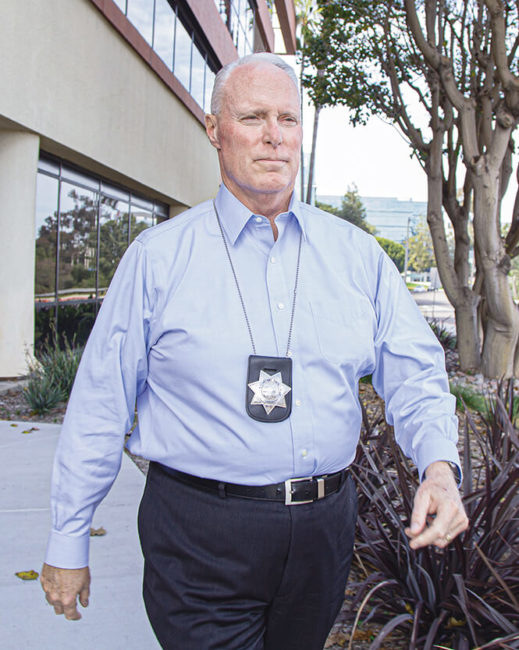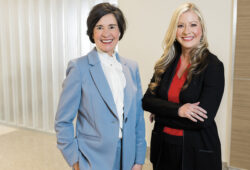Scripps Health CEO Chris Van Gorder relies on his background in law enforcement to lead community-centered change
WHEN CHRIS VAN GORDER WAS APPOINTED INTERIM CEO OF SCRIPPS HEALTH IN MAY OF 2000, it was a “code blue” situation. He inherited a large, San Diego-based healthcare system that was losing money and desperately needed to invest heavily in capital equipment. While a strong legacy endured, the health system was broken and needed to be rebuilt. Amid all the change, employees were anxious about their futures—and the news media was watching. “It was a difficult time,” remembers Van Gorder. “Everything needed to be fixed at once.”
It’s 20 years later, and Scripps has consistently met its goals every year since. Under Van Gorder’s leadership, the health system has grown exponentially. It has received national recognition as an employer of choice as well as for having high-performing, high-quality hospitals. How did the new-to-the-job CEO get it done? With a special approach … and unique training.
Preparing for the next line of duty
Van Gorder didn’t take the typical career path to hospital CEO. After having served eight years on the police force, he
was attacked while responding to a domestic situation. He was badly injured and spent time in a hospital recovering. No longer able to serve on active duty, the police department retired him.
Then, in a twist of fate, the hospital where Van Gorder received care hired him as the security director. He went back to graduate school and ultimately became a hospital administrator. With the training in law enforcement behind him, he was uniquely positioned to transform a health system.
Negotiating based on trust
Like any effective police officer and CEO, Van Gorder had to draw on his negotiating skills to get Scripps on the right path.
The physician group wanted a hefty raise to take emergency room calls. Because the emergency department is essentially the front door of the hospital, Scripps administrators would have had to shut down without physicians on call. Van Gorder explained that he could do it, but he’d have to tell the staff that they weren’t getting raises that year. He invited the physicians to help him manage scarce resources.
Van Gorder knew he had to start with rebuilding the relationship with physicians in order to negotiate. He began meeting with division chiefs and medical staff-elected representatives, and suggested the formation of an advisory group of physician leadership captains. “If we could find a way to fill the gap with information and transparently share our challenges with each other, then smart people would reach the same conclusion,” says Van Gorder.
The doctors studied the problem and acknowledged that they had no idea things were so dire. They negotiated and successfully came to an agreement. “When physicians owned the issue, in the end we got a better decision,” explains Van Gorder.
Customizing a communication style
The ability to read facial expressions and body language is crucial for police officers, because it helps them to mitigate potentially violent situations and other conflicts. Van Gorder uses body language as information and adjusts his communication style based on the visual cues he gets from people. “My training as a police officer enables me to defuse situations and make decisions quickly,” he says.
At Scripps, he established leadership academies as a communication strategy. There are academies for middle managers, physicians and front-line employees. He meets with the groups monthly and holds question-and-answer sessions for hours. “Middle managers are the most influential people we have. If they are on board, then we can swiftly make changes.”
Making sure that people understand the “why” behind decisions is a key to change management. “When people feel insecure about their jobs, they tend to resist change to protect themselves,” says Van Gorder.

To this day, Van Gorder lets his guard down and shares a lot with employees, so they view him as a human being who is not so different from them. His only rules are: no HIPAA violations, no nondisclosure agreements and no personal information about other colleagues. This approach makes people feel comfortable sharing both their concerns and aspirations with him.
As CEO, Van Gorder invests his time in talking with people at all levels of the organization—from board members and front-line employees to patients and their families. He sends a daily email to leadership that provides market news and trends, so they’re aware of what’s going on outside of their organization. He also answers every single one of the hundreds of emails he receives each day. Van Gorder saves time by delegating and trusting the people he works with. “I surround myself with good people and respect them enough to let them do their jobs,” he says.
Creating a culture of community
Any police officer can vouch for the fact that serving the community reaps huge rewards for all involved. That holds true in the corporate world as well. “Community work builds culture,” says Van Gorder.
As a result of what happened on 9/11, Scripps created a medical response team that would allow volunteer staff to go into communities in subsequent disaster situations. “After Katrina, the surgeon general asked us to respond to the Gulf,” says Van Gorder. Scripps sent three teams. Van Gorder went along with them in the role of chief storyteller. As the George Bush Convention Center in Houston filled with hundreds of survivors, the teams ran the medical center there for a period of time. There were countless inspiring stories. Van Gorder used his Blackberry to collect the stories and photos, and then emailed them each night to the thousands of employees and doctors back in California. “It was amazing how the culture shifted almost overnight,” he says. The power of storytelling filled everyone with pride. It reminded them of their collective purpose: to help people in their times of greatest need.
Van Gorder also believes that the heart of building a culture is celebrating the people within the community at home. He never gives a presentation without first telling a patient story. He believes that in light of all of the challenges the healthcare industry faces, it’s important to remind each other and the community of a hospital’s core mission—caring for people.
The focus on people and community is a part of what has allowed Van Gorder to lead Scripps to success. He’s never had to terminate anyone for missing their targets. Scripps also has a no-layoff philosophy. “It’s a philosophy, not a policy,” says Van Gorder. But he would consider a layoff his personal failure because “it would mean we didn’t anticipate the change in advance and made bad decisions or weren’t able to adjust.”
Forging ahead
Van Gorder still contends with the injuries he endured that night long ago while on watch. He has ongoing spinal cord problems and chronic migraines. “Luckily, I’m surrounded by excellent doctors,” he laughs. Whenever he gets frustrated, he walks around and sees patients. He also sometimes joins his wife, Rosemary, in her work at the hospital—visiting patients with their therapy dog, Amber. “I always come away knowing the work we do is important and there are patients having a much worse day than me,” he says. “Then I come back with a whole different attitude.”
As for Scripps Health, it has become one of the most successful health systems in the country. The health system has been ranked five times as one of the nation’s best healthcare systems by Truven Health Analytics. Its hospitals are consistently ranked among the best in the nation by U.S. News & World Report. Scripps also is recognized by Advisory Board, FORTUNE and Working Mother magazine as one of the best places in the nation to work. The organization has grown to acquire existing hospitals and open new ones, as well as new research institutes, outpatient centers and innovative community programs.
Scripps is working to update all of its hospitals by 2030 in order to meet California’s seismic safety codes, which, as Van Gorder puts it, “is like asking hospitals to change their wings while still flying in the air.” While it is challenging and expensive, he welcomes change and thrives under pressure. After 25 years, Van Gorder is still a police officer. He is a reserve assistant sheriff for the San Diego Sheriff’s Department. “I’m very proud of my background,” he says. After all, it’s where he learned to trust in his training and experience in order to give a major hospital system a clean bill of health.
Share Email Employee Retention, Q2 2020





